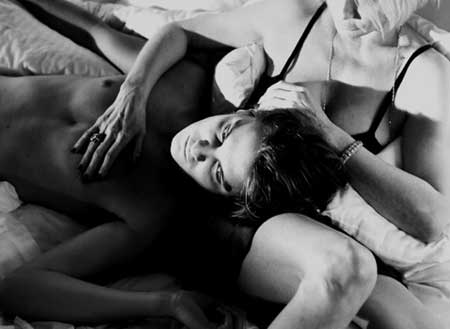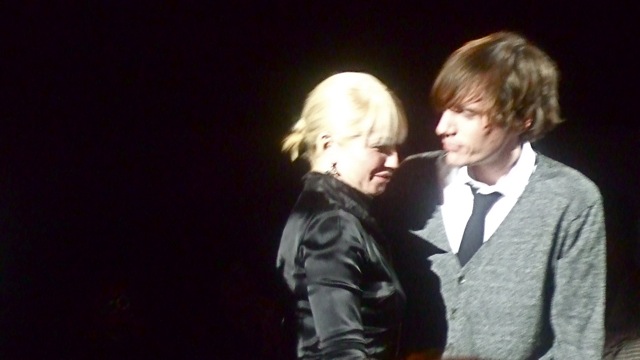 Back to selection
Back to selection
An Interview with Shit Year‘s Cam Archer
This post was originally published when Shit Year premiered at the Cannes Film Festival in 2010. The film opens today at the IFC Center.

It is both accurate and reductive to call Cam Archer’s Shit Year, which premiered at this year’s Cannes Film Festival in the Director’s Fortnight section, the story of a retiring actress grappling with the emotions produced by her move away from the Hollywood spotlight. Of course, on narrative terms, that is what it’s about. Ellen Barkin plays the actress, who has just given her final talk-show interview, moved to a cabin in the woods, and now spends her days avoiding her neighbors and flashing back to a brief affair she had with a younger actor (Luke Grimes) on the set of her last film. In an eerily composed performance, Barkin projects the steely emotional control of a woman determined not to descend into the full-blown sadness that seems just a beat away. It’s a performance that reminded me a bit of Tuesday Weld’s similarly dazed heroine in Frank Perry’s under-seen adaptation of Joan Didion’s Play it as it Lays. Both films — along with more recent work like David Lynch’s Inland Empire and Mulholland Drive — view Hollywood more as a corrosive mental state than an actual place.
But the film is also about other things that exist beyond the outlines of its plot and its often dead-on dialogue. What those other things are, however, is up to you. Freeing himself of the melodramatic conventions of the midlife crisis movie, or the Hollywood cautionary tale, Archer, shooting in beautiful black-and-white with his usual cinematographer, Aaron Platt, has captured a state that we all pass through at some point in our lives, a time in which the outside world recedes and all we are left with is what’s inside of us — and, perhaps, the company of an exotic space alien (played here by Theresa Randle) who would like to know just what it is that makes us tick.
I spoke with Archer for a few minutes at the American Pavilion in Cannes.

Filmmaker: What were the origins of Shit Year?
Archer: After making Wild Tigers I Have Known, the first [movie], I started to feel disenchanted by the creative process. I started thinking, what would it be like if I stopped making art. How would that affect my identity? Would I now mean something else? Do I define my work, or does my work define me? Could I exist without it? What I am getting out of it any more? I started to feel that it was losing the thrill that it once had [for me]. I had been obsessed, and I was starting to feel burdened, and that was shitty. I knew I didn’t want to make a movie about a filmmaker [to explore these ideas], but an actress seemed more interesting to me — someone who is already stepping into other identities and removing themselves from themselves. And then I thought, what if that actress is retiring? Which is silly, because they don’t retire — for the most part, they just stop getting work. And then I thought, [this actress is going] to detach, and it would be no better than what she already had. At the same time, I was realizing that I don’t want to be a regular [person]. What would I do? All I want to do is make work. It’s ridiculous to think I’m going to stop because it gets more difficult.
Filmmaker: What do you think Ellen Barkin’s motivation to do your movie was? It couldn’t have been a given that she’s going to automatically want to do an independent experimental film.
Archer: Yes, well, who wants to play an actress who feels undesired as an actress? That’s not very glamorous! But I think she just saw herself in the role — it scared her but it also really intrigued her. I didn’t write it for her, but I imagine that a lot of women who have worked in Hollywood so steadily for so long get to this point where they are not working there so steadily in lead roles. She has, or is, experiencing that. She keeps going around saying it’s the greatest role of her career, which is very nice to hear, but I don’t know if she knew that when we were doing it. I think that comes from her allowing herself to be as vulnerable and raw [in Shit Year] as she really is. They are my words [in the film], but it’s her character. It’s hers. She took it.
Filmmaker: It’s interesting to think of her evolution as an actress and public persona. When she first appeared on screen, she had a real awkward and vulnerable quality. I think her persona is quite different now. There was her very public marriage to Ron Perelman and their break-up, and, related or not, I think there is a kind of guarded quality to her. I felt your film really engaged with that element of her persona.
Archer: I think that fragile quality is still there. If you just meet her once, she has this shield that she wears, but then, once that shield starts to come down, you enter this world that’s very secretive. I know very little about [her marriage and break-up], but I know it got a lot of media attention, and I think that has affected how she chooses to perform and when.
Filmmaker: Tell me a little bit about coming up with the structure for your film. You have purposefully avoided the standard dramatic structure in which the character goes through a series of challenges that produce an epiphany of some kind.
Archer: I don’t know how to do that, but I also don’t try to do that. What does end up coming out [in my writing] is typically this fragmented series of worlds. It’s not like I sit down and think, time to write another art film! It’s just, time to write another film.
Filmmaker: To what extent does Shit Year exist as a whole script?
Archer: The edit is actually very similar to the script. It’s all written. There are maybe two lines that [Ellen] changed, but otherwise it’s all very much my words. At the same time, she made them her own.
Filmmaker: What was the production like? Was it a conventional shooting schedule?
Archer: We shot over a period of four weeks.
Filmmaker: You shot it all together?
Archer: Yeah. We did some reshoots in Santa Cruz, but everything was in Los Angeles. It was challenging because this is the first film in which I worked with professional actors for every role. That was difficult — I’m so used to working with these kids who don’t know anything about performing, and that’s fantastic because it allows me to shape and mold them. But with these actors, it was hard for me to see where I could be the most useful because they’re already so talented. I had so many conversations with Ellen on the phone before the film, and I realize now that so much of the direction of her character came from [those calls] and building this mutual trust.
Filmmaker: Now that you’d made the film, are you finding that it has meanings for you beyond that original impulse of exploring not being an artist?
Archer: Oh, yes.
Filmmaker: I mean, I understand the idea of this person whose life has been defined by what they do, and losing that, but I feel that the movie is about other things too.
Archer: Yeah. I think [those other meanings] are there. I like the film to be open to other people’s interpretations. I think there is this constant fight [in the film] between the light and the dark, and it’s causing some major turmoil. [Ellen] has this line, “I fear the end of loss.” I wrote the line originally as, “I fear loss.” She changed it to “I fear the end of loss.” When she said it, I said, “I don’t really get that. What do you mean?” Later, I realized, oh right… And that started to affect the rest of the filming, that idea of no longer being able to lose, of having nothing. There are a lot of different layers going on.
